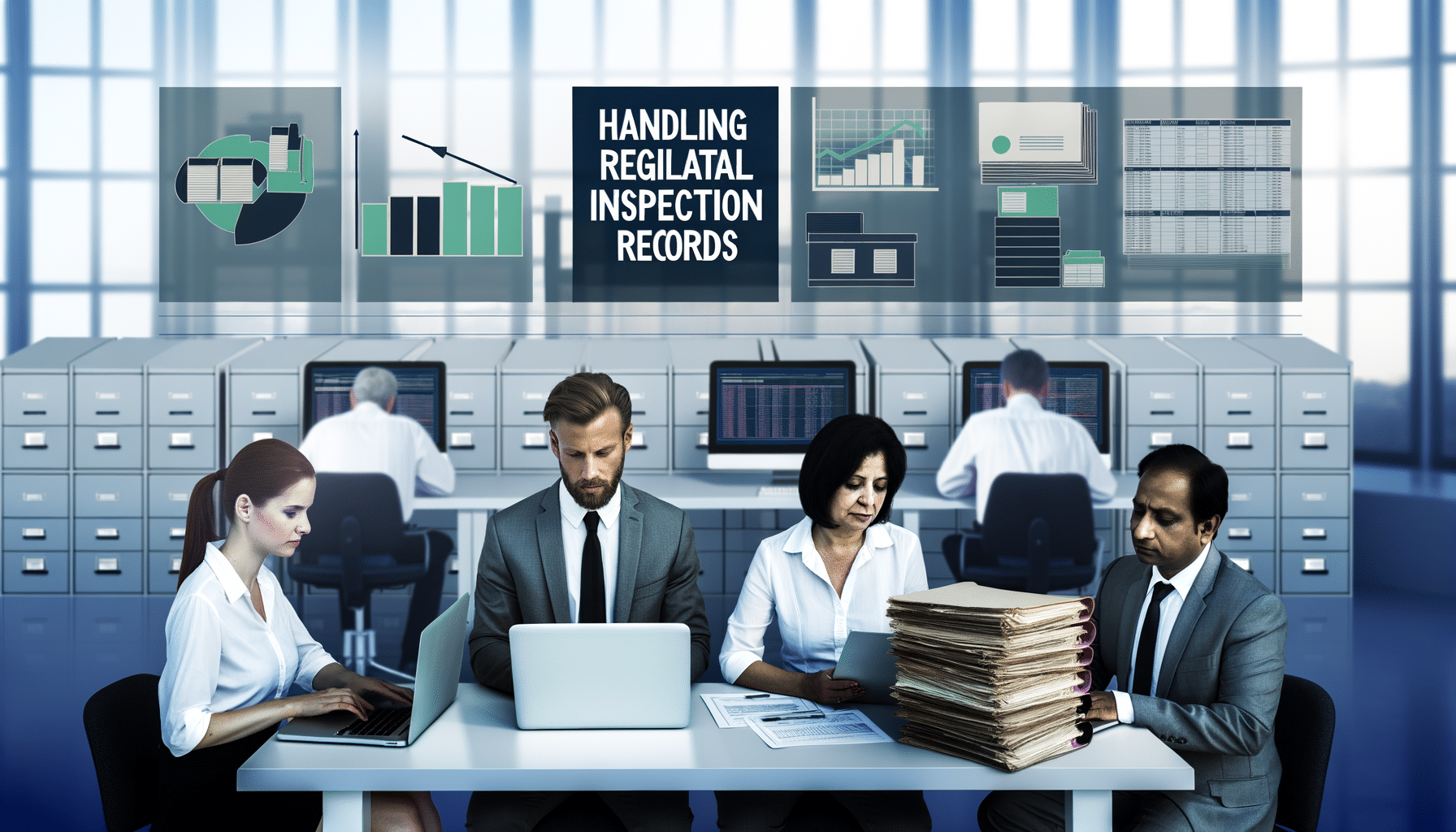- Blockchain Compliance
- September 28, 2023
How Smart Contracts Enable Automated Compliance in Record-Keeping

In the fast-evolving landscape of digital transformation, I’ve noticed how often the need to align efficient record management with stringent compliance regulations surfaces as a top concern for organizations. Meeting these compliance standards isn’t just about ticking off requirements—it’s about reinforcing trust and reliability, crucial in today’s competitive market. This is where the synergy between blockchain-enabled smart contracts and record-keeping presents groundbreaking potential.
Unpacking Smart Contracts in Record-Keeping
At RecordsKeeper.AI, we harness the power of smart contracts as a pivotal catalyst for transforming traditional record-keeping processes. For those who might be new to the term, smart contracts are self-executing contracts with the terms of the agreement directly written into code. They reside on the blockchain and automatically enact actions specified in their code when predetermined conditions are met.
With their autonomous operations, smart contracts eliminate the need for a third party while adding layers of security and efficiency that manual processes simply can’t rival. The immutable nature of blockchain ensures that once a record is written, it remains tamper-proof, a key feature for maintaining integrity and trust in compliance-related record management.
Streamlining Compliance
One of the most compelling advantages of incorporating smart contracts into record-keeping is their ability to automate compliance processes. Here’s a breakdown of how they can make an impactful difference:
- Automated Verification: Smart contracts can verify that conditions for compliance are met before executing an action. For example, in financial auditing, a smart contract can ensure every transaction adheres to the necessary regulations before documenting and finalizing it.
- Real-time Reporting: Compliance often requires timely reporting of actions and events. Smart contracts can automate this by ensuring that as soon as compliance thresholds are reached, relevant reports are generated and shared with stakeholders, reducing the risk of human error.
- Seamless Audit Trails: Blockchain’s transparency means every action recorded is traceable, aiding audits. Smart contracts record each step taken, providing an indelible, chronological trail that auditors can easily access and verify.
Ensuring Security and Confidentiality
Security remains a cornerstone of both compliance and record-keeping. The decentralized nature of blockchain ensures that records are not vulnerable to single points of failure or breaches that can often be a danger in centralized systems. Smart contracts enhance this security model by restricting access and mounting defences against unwarranted tampering.
Furthermore, sensitive records shared through our platform’s secure data rooms are accessible only to authorized parties. The blockchain’s inherent security model aids in meticulous access control and activity tracking, further guaranteeing that confidentiality is maintained without question.
Practical Compliance Management Solutions
Thanks to blockchain and smart contracts, automating regulatory workflows is not just a concept—it’s actively improving organizational compliance. Here are a few ways it can be applied:
- GDPR and Data Privacy: Automating compliance with data privacy regulations can be achieved hands-free with smart contracts. For instance, automating data deletion after predetermined retention periods fulfills GDPR requirements efficiently.
- Healthcare Regulations: In compliance with HIPAA, smart contracts securely manage patient records, ensuring both protection and ease in information accessibility when permissible by law.
- Financial Standards: Ensuring SOX compliance, smart contracts automatically validate financial records by predefined standards and indicate any anomalies immediately, allowing rapid response.
Looking Towards the Future
The utilization of smart contracts in record keeping defines a transformative shift for compliance management. At RecordsKeeper.AI, I’m committed to continually refining and expanding how these incredible technologies can eliminate the common friction points of compliance while enhancing efficiency and security.
Smart contracts are not just the future—they are the present that is already unveiling its potential. For organizations striving to modernize their record management practices, embracing this technology could prove to be the best strategic move. Dive deeper with us at RecordsKeeper.AI to explore how these innovations can propel your organization to new heights of compliance and beyond.
Let’s embrace this journey of innovation together. Join me in exploring the wonderful world of blockchain technology and smart contracts, and feel free to reach out to me if you have questions or insights to share. Together, we can transform record-keeping into a robust, future-ready asset that leverages the full spectrum of digital possibilities.
Toshendra Sharma is the visionary founder and CEO of RecordsKeeper.AI, spearheading the fusion of AI and blockchain to redefine enterprise record management. With a groundbreaking approach to solving complex business challenges, Toshendra combines deep expertise in blockchain and artificial intelligence with an acute understanding of enterprise compliance and security needs.
Related Posts


Handling Regulatory Inspection Records
Managing documentation for regulatory compliance.
- January 3, 2025
Archives
- January 2025
- December 2024
- November 2024
- October 2024
- September 2024
- August 2024
- July 2024
- June 2024
- May 2024
- April 2024
- March 2024
- February 2024
- January 2024
- December 2023
- November 2023
- October 2023
- September 2023
- August 2023
- July 2023
- June 2023
- May 2023
- April 2023
- March 2023
- February 2023
- January 2023
- December 2022
- November 2022
- October 2022
- September 2022
Want to get more content like this?
Signup to directly get this type of content to your inbox!!
Latest Post
Document Control for Equipment Maintenance
- January 20, 2025
Managing Records for Multiple Clients
- January 19, 2025
Handling Conference Documentation
- January 18, 2025
Setting Up Department Record Reviews
- January 17, 2025





